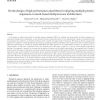Free Online Productivity Tools
i2Speak
i2Symbol
i2OCR
iTex2Img
iWeb2Print
iWeb2Shot
i2Type
iPdf2Split
iPdf2Merge
i2Bopomofo
i2Arabic
i2Style
i2Image
i2PDF
iLatex2Rtf
Sci2ools
125
click to vote
JPDC
2007
2007
On the design of high-performance algorithms for aligning multiple protein sequences on mesh-based multiprocessor architectures
In this paper, we address the problem of multiple sequence alignment (MSA) for handling very large number of proteins sequences on mesh-based multiprocessor architectures. As the problem has been conclusively shown to be computationally complex, we employ divisible load paradigm (also, referred to as divisible load theory, DLT) to handle such large number of sequences. We design an efficient computational engine that is capable of conducting MSAs by exploiting the underlying parallelism embedded in the computational steps of multiple sequence algorithms. Specifically, we consider the standard Smith–Waterman (SW) algorithm in our implementation, however, our approach is by no means restrictive to SW class of algorithms alone. The treatment used in this paper is generic to a class of similar dynamic programming problems. Our approach is recursive in the sense that the quality of solutions can be refined continuously till an acceptable level of quality is achieved. After first phas...
Related Content
| Added | 16 Dec 2010 |
| Updated | 16 Dec 2010 |
| Type | Journal |
| Year | 2007 |
| Where | JPDC |
| Authors | Diana H. P. Low, Bharadwaj Veeravalli, David A. Bader |
Comments (0)

